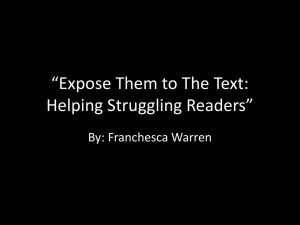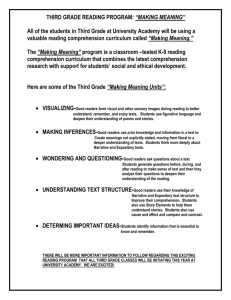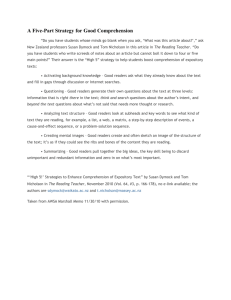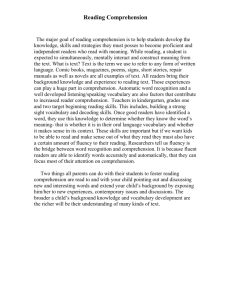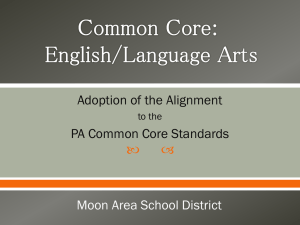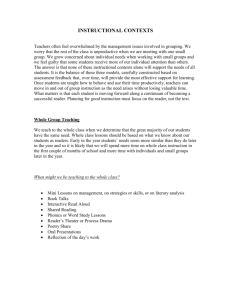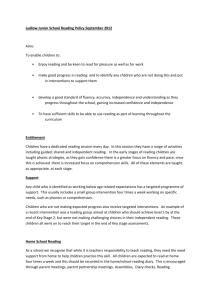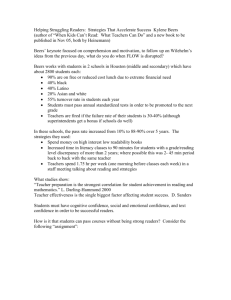Journeys Lesson Overview for Grades 3rd, 4th, and 5th GENERAL
advertisement
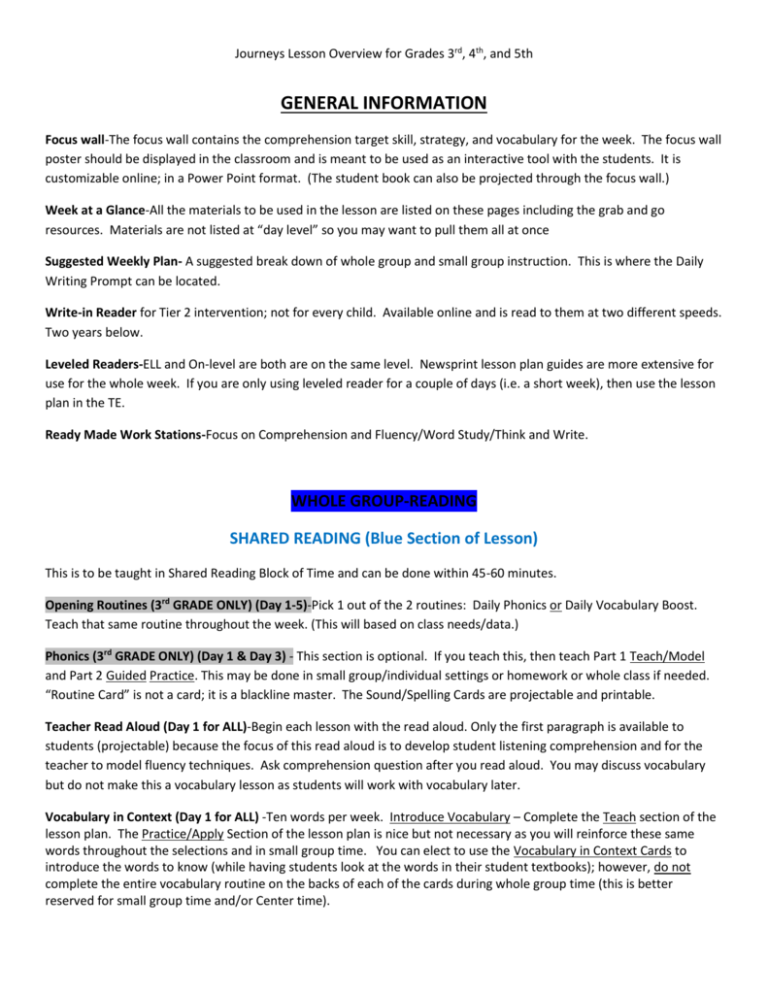
Journeys Lesson Overview for Grades 3rd, 4th, and 5th GENERAL INFORMATION Focus wall-The focus wall contains the comprehension target skill, strategy, and vocabulary for the week. The focus wall poster should be displayed in the classroom and is meant to be used as an interactive tool with the students. It is customizable online; in a Power Point format. (The student book can also be projected through the focus wall.) Week at a Glance-All the materials to be used in the lesson are listed on these pages including the grab and go resources. Materials are not listed at “day level” so you may want to pull them all at once Suggested Weekly Plan- A suggested break down of whole group and small group instruction. This is where the Daily Writing Prompt can be located. Write-in Reader for Tier 2 intervention; not for every child. Available online and is read to them at two different speeds. Two years below. Leveled Readers-ELL and On-level are both are on the same level. Newsprint lesson plan guides are more extensive for use for the whole week. If you are only using leveled reader for a couple of days (i.e. a short week), then use the lesson plan in the TE. Ready Made Work Stations-Focus on Comprehension and Fluency/Word Study/Think and Write. WHOLE GROUP-READING SHARED READING (Blue Section of Lesson) This is to be taught in Shared Reading Block of Time and can be done within 45-60 minutes. Opening Routines (3rd GRADE ONLY) (Day 1-5)-Pick 1 out of the 2 routines: Daily Phonics or Daily Vocabulary Boost. Teach that same routine throughout the week. (This will based on class needs/data.) Phonics (3rd GRADE ONLY) (Day 1 & Day 3) - This section is optional. If you teach this, then teach Part 1 Teach/Model and Part 2 Guided Practice. This may be done in small group/individual settings or homework or whole class if needed. “Routine Card” is not a card; it is a blackline master. The Sound/Spelling Cards are projectable and printable. Teacher Read Aloud (Day 1 for ALL)-Begin each lesson with the read aloud. Only the first paragraph is available to students (projectable) because the focus of this read aloud is to develop student listening comprehension and for the teacher to model fluency techniques. Ask comprehension question after you read aloud. You may discuss vocabulary but do not make this a vocabulary lesson as students will work with vocabulary later. Vocabulary in Context (Day 1 for ALL) -Ten words per week. Introduce Vocabulary – Complete the Teach section of the lesson plan. The Practice/Apply Section of the lesson plan is nice but not necessary as you will reinforce these same words throughout the selections and in small group time. You can elect to use the Vocabulary in Context Cards to introduce the words to know (while having students look at the words in their student textbooks); however, do not complete the entire vocabulary routine on the backs of each of the cards during whole group time (this is better reserved for small group time and/or Center time). Journeys Lesson Overview for Grades 3rd, 4th, and 5th Developing Background (Day 1 for 4th & 5th) (Day 2 for 3rd)-The Teach/Model and Guided Practice (parts 1 and 2) of the lesson plan are essential; The Apply (part 3) of the lesson plan is nice but not essential as students will be applying these skills all week. The Selection Vocabulary Section is nice but not necessary as students will be exposed to selection vocabulary during the selection itself. Introduce Comprehension-Comprehension skill and strategy (Day 2 for ALL) - The Teach/Model and Guided Practice (parts 1 and 2) of the lesson plan are essential; the Apply (part 3) of the lesson plan is nice but not essential as students will be applying the comprehension skill all week. Use the projectables to make it interactive; they are available on Think Central. Practice pages may be given for homework. On-level practice will be in TE/book. Leveled practice is in Grab and Go folder. Introduce the main selection/story for the week (Day 2-3 for ALL) - Note: There are many different ways to “read” the main selection. The teacher can read, the students can read individually, silently, in groups, in pairs or the students can listen to the audio. Teachers can ask all the comprehension questions in the margin of the TE; however, when pressed for time, it may be better focus in on the questions with the RED CHECK marks as these are geared towards the comprehension skill/strategy for the week. Note: It is a good idea to continue filling out the projectable during the story as still will see application of the skill you have just taught them. Your Turn (Day 3 for 4th & 5th) (Day 2 for 3rd) - Student should be able to answer these questions independently or in small groups. Note that Question #4 is always devoted to Oral Language Skills. (No “quiz” at the end of the story. This page focuses on the skill and strategy of the week. Do they know the skill and strategy? Weekly tests are available for more questions.) Paired Selections (“Connect to …”) (Day 4 for ALL)-selections correlate to science and social studies TEKS. Complete the story as outlined in the TE. Making Connections- Text-to-text connections are very important, especially in 4th. If pressed for time, do not do all 3 connections, just do Text to Text. Note that you could divide the class into groups and have each group work on ONE of the connections if needed. Text-to-world can be done as project work. Deepen Comprehension (Optional) (Day 3) - Although this is a very good part of the lesson, it is an area that could potentially be “skipped”. (Nice but not necessary.) Its purpose is to get students to continue deepening the comprehension skill they have been working on throughout the week; to provide more practice. It’s a way to take it to the next level. Projectable, can be copied for the class as an independent practice. Fluency and Decoding for 4th & 5th (Optional) (Day 1-5) - These pages can be used if students need it, but the teacher must evaluate the students at this grade level to determine need based on data. If they don’t need fluency/decoding practice (as many Grade 3 and beyond students do not), then feel free to skip over these pages. This can be done in tutoring/Saturday school etc, with struggling students, if needed. Vocabulary Strategies (Optional) (Day 4) - This is a nice part of the lesson but isn’t necessary. However, be aware that if you use the weekly vocabulary assessment piece, it will “assess” students on both the vocabulary for the week, as well as the vocabulary strategies. Because of that, I would teach this part of the lesson, but restrict primarily to parts 1 and 2 of the teaching plan. So, if you give weekly test for vocabulary then you need to teach at least parts 1 and 2. Connect and Extend (Optional) (Day 5) - Although this is a nice part of the lesson plan, most teachers opt to assess on Fridays rather than connect and extend. These can also be center ideas or project ideas. Journeys Lesson Overview for Grades 3rd, 4th, and 5th WHOLE GROUP SPELLING, GRAMMAR, WRITING (Green Section of Lesson) This is to be taught in the Language Arts Block of Time and can be done within 45-60 minutes Note: For Grade 3, Spelling / Grammar /Writing lessons are found throughout the Whole Group Section-daily. For Grade 4 & 5, Spelling / Grammar /Writing lessons appear at the END of the Whole Group Section, for flexibility. (That does not mean you wait to the end of ALL the Reading to get to grammar.) Spelling-spelling lists are on the practice page from the practice book Day 1 Teach the Principle Days 2 and 3 Practice Activities (i.e. word sorts/word families) Day 4 Connect to Writing Day 5 Assess Spelling Grammar lessons – daily progression. Connecting the grammar to the writing-Student pages, may be sent for homework. Days 1-3 Teach using Daily Proofreading projectables and practice book Day 4 Review Day 5 Connect to Writing Writing- Focus Trait taught weekly. Each writing piece has its own rubric. Day 5 is usually the independent writing piece and takes the longest; culminating. The last 2 lessons of each unit is a Writer’s Workshop. Day 1 Analyze the model using projectable Day 2 Teach the focus trait using practice book Day 3 Prewrite using projectable Day 4 Draft Day 5 Revise for Ideas and edit WriteSmart CD for whole group lessons or small group instruction. Write Smart program is also available on Think Central website. This resource provides writing prompts and mentor texts, etc. Journeys Lesson Overview for Grades 3rd, 4th, and 5th SMALL GROUP GUIDED READING Based on the amount of time spent in whole group (i.e. 45-60 minutes), you should have 30-45 minutes for small group instruction (with likely 20 minutes spent with your struggling students). Suggested plans for the week. You could never do all of it! Most important are the Teacher-Led activities (in blue). When looking at the Suggested Small Group Plan, decide which group you want to spend the most time with each day (for example: struggling readers). Plan your small group lessons around the group you’re spending the most time with. For example, maybe I actually “do” the suggested small group teacher-led plan with my struggling readers each day. However, my other students might be doing activities from the “What are my other kids doing?” section (in yellow). Readymade workstations can be used any time. Leveled readers can also be used in centers because of the Response page. You may also have a Writing Center with Write Source CD. Also consider the Vocabulary Context cards as a center activity. Weekly To-Do List- is a weekly contract for small group activity. Feel free to customize as needed so students know where they are doing and what they are doing during small group time. Reading Log-is available in Grab and Go kit. Lesson Plans for Leveled Rooks-Teachers will notice that lesson plans for the leveled readers can be located in two main places. First, there is the suggested lesson plan in the Journeys TE. Second, there is the 8-page lesson plan provided directly with the leveled readers. This is the magazine print lesson plan. (These lessons can also be found at the Houghton Mifflin Website.) You may follow the plans in the TE if you are only meeting with the struggling group, for example, during a short week. During a regular week, it is expected that the 8-page lesson plan be followed. 8-Page Guided Reading Lesson Plan Format Day 1: Vocabulary Reader Day 2: Leveled Reader o Build Background o Introduce the Text Day 3: o Read o Discuss & Revisit the Text Thinking within the text Thinking beyond the text Thinking about the text Day 4: o Writing about the Reading Critical Thinking Responding Day 5: o English Language Development (as needed) o Running Records Journeys Lesson Overview for Grades 3rd, 4th, and 5th Journeys TE Guided Reading Lesson Plan Format Day 1: o Vocabulary Readers – Because the emphasis for Day 1 is Vocabulary, the corresponding Small Group Lessons pertain to Vocabulary Readers. You might be working with your struggling readers in the vocabulary readers while other students are working on workstation flip charts or working with the Vocabulary in Context Cards. Day 2: o Differentiate Comprehension – Again, these are GREAT lessons for your struggling kids. I would recommend doing the Differentiate Comprehension lesson with the struggling readers while the other students are working with ready-made workstations or perhaps using the Vocabulary in Context Cards (and completing the activities on the backs of the cards). Day 3: o Leveled Readers – Note that the leveled readers are referenced on day 3 during small group; however, they can be used on multiple days. It would be a good idea to have all students working in leveled readers at least on day 3 and rotating to the 3 groups to assist them. Note that on and above level students could be working in leveled readers all week. Day 4: o Differentiate Vocabulary Strategies – These are good lessons…but many teachers I have observed are actually using their leveled readers on Day 3 and Day 4 of small group (feel free to extend the leveled readers over several days as needed) Day 5: o Options for Reteaching – These are nice lessons because it allows you to reteach any of the key concepts for the week based on how the students are doing. You may not want/need to do all the reteaching lessons. Other students could be working on reading logs, independent workstations, reading silently, etc. Other Resources Intervention tab-contains lesson plans for write-in reader. English Language Learners tab- available for extra ELL support. Resources tab-contains mini-lessons for study skills; word lists for each lesson; rubrics for writing pieces https://www-k6.thinkcentral.com/ePC/start.do http://www.hmheducation.com/tx/journeys/
